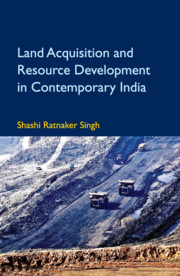Book contents
- Frontmatter
- Contents
- List of Figures
- List of Maps
- List of Tables
- List of Abbreviations
- Foreword
- Acknowledgements
- Part I Theoretical Framework
- 1 Introduction: From Colonial Regime to ‘Welfare State’?
- 2 State, Space and People
- 3 Land, Mines and Minerals
- 4 Land Acquisition and Resource Development in India
- 5 Resource Development and Compensation Issues
- Part II Case Study
- 6 Singrauli: A ‘Space’ of Dependence
- 7 Singrauli: A Development Dilemma
- 8 Administering Singrauli: Governance and Institutions
- 9 Land Acquisition and Its Socio-economic Implications: Field Survey
- Part III Analysis
- 10 Understanding Development
- 11 Conclusion
- Appendix: Memorandum from Mineral-Bearing States
- Bibliography
- Index
8 - Administering Singrauli: Governance and Institutions
Published online by Cambridge University Press: 16 October 2020
- Frontmatter
- Contents
- List of Figures
- List of Maps
- List of Tables
- List of Abbreviations
- Foreword
- Acknowledgements
- Part I Theoretical Framework
- 1 Introduction: From Colonial Regime to ‘Welfare State’?
- 2 State, Space and People
- 3 Land, Mines and Minerals
- 4 Land Acquisition and Resource Development in India
- 5 Resource Development and Compensation Issues
- Part II Case Study
- 6 Singrauli: A ‘Space’ of Dependence
- 7 Singrauli: A Development Dilemma
- 8 Administering Singrauli: Governance and Institutions
- 9 Land Acquisition and Its Socio-economic Implications: Field Survey
- Part III Analysis
- 10 Understanding Development
- 11 Conclusion
- Appendix: Memorandum from Mineral-Bearing States
- Bibliography
- Index
Summary
This chapter documents the role of the state government, financial institutions, public sector undertakings (PSUs) and private developers in facilitating resource development projects in the Singrauli region. It explores the objective behind the creation of the Special Area Development Authority (SADA) in the 1980s, the challenges faced by the institution, and how the institution has evolved in the course of time. This research attempts to document the responses of respective stakeholders concerning the development of institutions in Singrauli. It also records the researcher's own experiences and associations with the district. It is important to note that the discourse on SADA has not been documented adequately, and there is sparse literature on the subject. Relevant documents related to this aspect were collected and analysed and concerned officials were interviewed to gather different perspectives on the successes and failures of SADA. This chapter highlights the reasons behind the reorganization of space or redrawing of geographical boundaries of the mineral-rich space of Singrauli and the creation of this new district. This chapter documents the existing compensation mechanisms and stakeholders’ views with regard to resource development and centre–state relations with regard to land acquisition and resource development issues. Local community perceptions of the administration, mining benefits sharing and potential institutional framework for regional development were captured.
Administrative Region: Singrauli
Prior to the formation of the district, the Singrauli region was referred to as a large area (heavily forested) spread across the states of Madhya Pradesh (MP) and Uttar Pradesh (UP). Earlier, the region straddled the states of UP and MP and encompassed a part of Sidhi district of MP and Sonebhadra district of UP. The Sidhi and Sonebhadra districts have traditionally been considered backward districts (NITI Aayog, 2019) and, in particular, the area of Rihand in UP and Waidhan in MP were heavily forested, inhabited mainly by tribals and subsistence farmers and largely isolated from modern Indian society. Infrastructure was sparse, and subsistence agriculture and forest gathering were the predominant sources of livelihood in the region (Lokayan, 1985).
The discovery of coal, coupled with the creation of the Govind Ballabh Pant Sagar (GBPS) reservoir, or the Rihand lake, drastically altered the situation in the region. Hindalco (company owned by the Birlas) established a large alumina smelter and aluminium plant, and Northern Coalfields Ltd (NCL) developed opencast coal mining in the region.
- Type
- Chapter
- Information
- Land Acquisition and Resource Development in Contemporary India , pp. 137 - 162Publisher: Cambridge University PressPrint publication year: 2021



